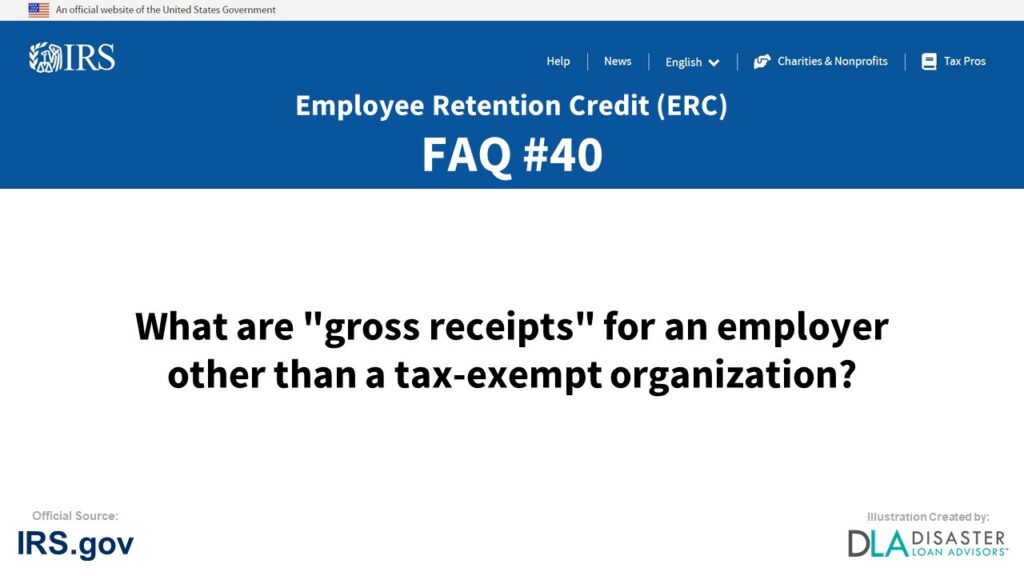
Frequently asked question #40 “What are gross receipts for an employer other than a tax-exempt organization?” under the Determining When an Employer is Considered to have a Significant Decline in Gross Receipts section of FAQs: Employee Retention Credit under the CARES Act, provided by the IRS.gov to help business owners understand the ERC program. Information is below for the question #40 What are “gross receipts” for an employer other than a tax-exempt organization?
ERC Credit Frequently Asked Question #40:
COVID-19-Related Employee Retention Credits:
Determining When an Employer is Considered to have a Significant Decline in Gross Receipts and Maximum Amount of an Eligible Employer’s Employee Retention Credit FAQs
40. What are “gross receipts” for an employer other than a tax-exempt organization?
“Gross receipts” for purposes of the Employee Retention Credit for an employer other than a tax-exempt organization has the same meaning as when used under section 448(c) of the Internal Revenue Code (the “Code”).
Under the section 448(c) regulations, “gross receipts” means gross receipts of the taxable year and generally includes total sales (net of returns and allowances) and all amounts received for services.
In addition, gross receipts include any income from investments, and from incidental or outside sources. For example, gross receipts include interest (including original issue discount and tax-exempt interest within the meaning of section 103 of the Code), dividends, rents, royalties, and annuities, regardless of whether such amounts are derived in the ordinary course of the taxpayer’s trade or business.
Gross receipts are generally not reduced by cost of goods sold, but are generally reduced by the taxpayer’s adjusted basis in capital assets sold.
Gross receipts do not include the repayment of a loan, or amounts received with respect to sales tax if the tax is legally imposed on the purchaser of the good or service, and the taxpayer merely collects and remits the sales tax to the taxing authority.
For more Internal Revenue Service (IRS) Department of the Treasury Employee Retention Credit (ERC) Determining When an Employer is Considered to have a Significant Decline in Gross Receipts FAQs, visit the official IRS.gov tax website.
Conclusion and Summary on ERC Credit FAQ #40. What are “gross receipts” for an employer other than a tax-exempt organization?
The “What are gross receipts for an employer other than a tax-exempt organization?” is Frequently Asked Question #40 of many commonly asked questions small business owners are wondering about how to file the Employee Retention Tax Credit (ERTC). The IRS ERC Tax Credit program is a confusing and complex process to determine the correct ERC calculations your business qualifies for. Answers to “What are gross receipts for an employer other than a tax-exempt organization?” and filling out form 941-X may change slightly from frequently updated rules and regulations from the IRS. Leave a comment below if you have further questions on ERC Credit FAQ #40.
Help Completing / Filing / Claiming the Employee Retention Credit (ERC)
Receive Up to a $26,000 ERC Credit from the IRS Per Employee
Disaster Loan Advisors can assist your business with the complex and confusing Employee Retention Credit (ERC), Form 941-X, and the Employee Retention Tax Credit (ERTC) program.
Depending on eligibility, business owners and companies can receive up to $26,000 per employee based on the number of W2 employees you had on the payroll in 2020 and 2021.
The ERC / ERTC Tax Credit Program is a valuable IRS tax credit you can claim. This is money you have already paid to the IRS in payroll taxes for your W2 employees.
We DO NOT charge a percentage (%) of your ERC Refund like some companies are charging. Some ERC firms out there are charging upwards of 15% to 35% of your ERC refund!
Our professional ERC fee and pricing structure is very reasonable in comparison.
If you are looking for an ERC Company that believes in providing professional ERC Services and value, in exchange for a fair, reasonable, and ethical fee for the amount of work required, Disaster Loan Advisors is a good fit for you.
Schedule Your Free Employee Retention Credit Consultation to see what amount of employee retention tax credit your company qualifies for.
Cover Image Credit: Irs.gov / ERC FAQ / Disaster Loan Advisors.
